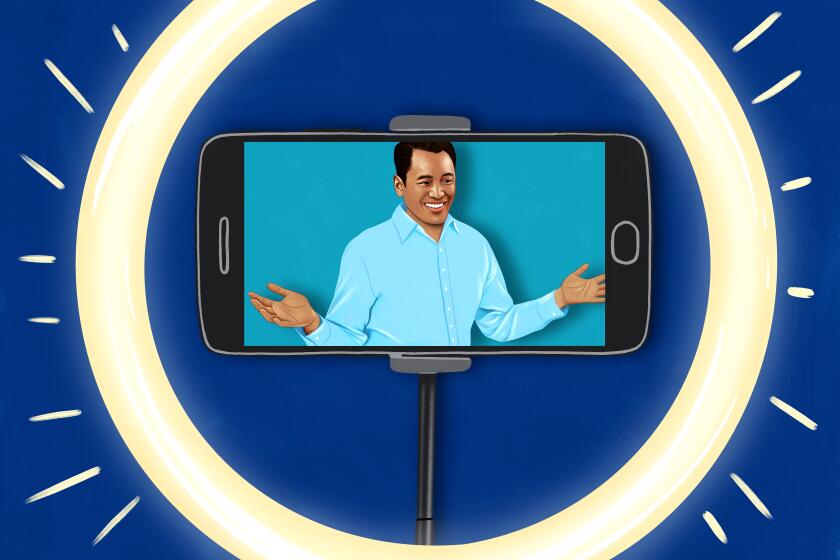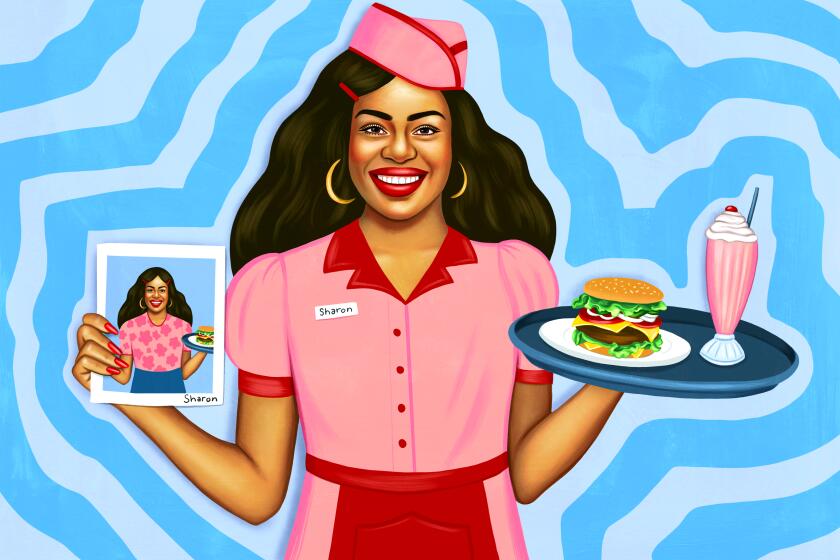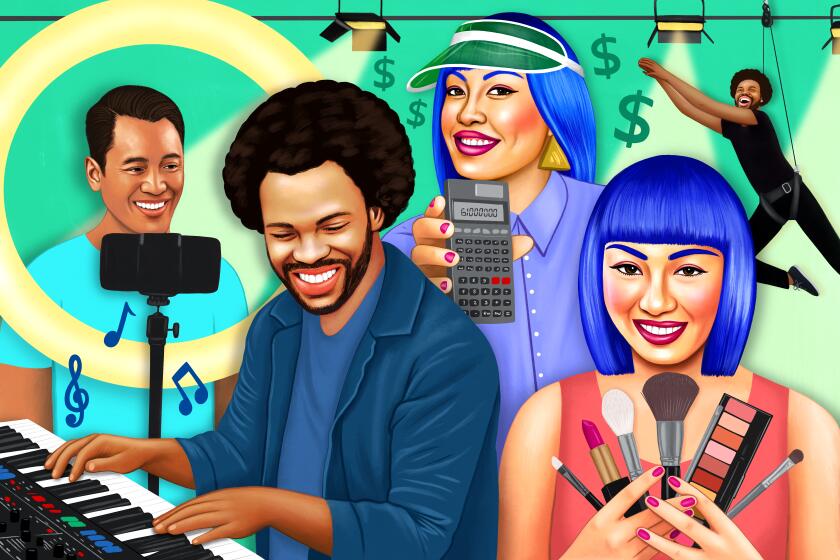Explaining Hollywood: How to get a job as a dialect coach

- Share via
If you speak English with a California accent but you want to learn to speak Sindarin like a native — that is, like a Middle Earth elf — where do you start?
Begin with vowel sounds, said Leith McPherson, the supervising dialect coach on “The Lord of the Rings: The Rings of Power.” The main two tweaks are “A” — which in Sindarin sounds like “ah” in “father” — and “U” which is pronounced like the “U” in “put.”
It’s also about musicality. Perhaps it’s a stereotype, McPherson admitted, but if you’re a Californian whose voice tends to get higher at the end of a sentence? Like you’re asking a question even though you’re not asking a question? You might want to tone that down. “This is not an Elvish thing to do,” she said.

But Spanish speakers — of which there are many in California — actually have a “home language advantage,” she said. Spanish vowels overlap with Sindarin ones, and Spanish speakers already can trill their Rs with the best of elves.
“Rings of Power” director J. A. Bayona‘s pronunciation of Galadriel was “exquisite,” she said, and one of her biggest joys from working with a more diversely-cast Middle Earth cast was seeing how Puerto Rican actor Ismael Cruz Córdova (who plays Arondir) nailed the language.
In Hollywood, dialect coaches like McPherson are usually hired by actors or producers. The job can involve helping an actor speak a nonnative language; adopt a specific accent (In “Loving,” Samara Bay helped Ruth Negga, from Ireland, and Joel Edgerton, from Australia, sound like a couple from rural Virginia); or both (Junko Goda taught Thandiwe Newton a very traditional pre-1960s version of Japanese for the Shogun episode of “Westworld”).
The role of the dialect coach is often invisible, because the goal is for the actor to speak with the accent so seamlessly that it seems effortless.
The work can start with spelling out the phonetics or giving recordings to help an actor practice. Coaches may be hired to be on the set or join the postproduction work where actors re-record the dialogue.
But the productions that really value the work, said Garrett Strommen of the language company Strømmen, understand that it’s best to hire dialect coaches months in advance.
“What you want to do is you want to give it to [actors] in a very specific way, early enough so that it becomes second nature,” veteran dialect coach Denise Woods said. “So they don’t have to think about it when they’re acting.”
Because they might also have to hang off a horse and fire arrows while they are speaking perfect Elvish, said McPherson.
For the record:
3:42 p.m. Feb. 6, 2023A previous version of this story said that Samara Bay coached Gal Gadot for both Wonder Woman roles. Bay only coached Gadot in “Wonder Woman 1984.”
What does it take to be a dialect coach? Here’s some advice from McPherson, Strommen, Woods (whose first job was coaching Taye Diggs in “How Stella Got Her Groove Back”); Goda (who worked the “PEN15” episode dedicated to Maya’s Japanese immigrant mother); Bay (who coached Gal Gadot for “Wonder Woman 1984”); Josh Feliciano-Sanchez Moser, dialect coach and assistant professor at Kean University’s Theatre Conservatory; and Jennifer Greer, who teaches voice and speech at AMDA College of the Performing Arts in Los Angeles.
Who becomes a dialect coach?
When Bay was studying acting, she said she’d nerd out during the classes where they learned the International Phonetic Alphabet.
“I’d look around, see my fellow actors and their eyes glazed over,” she said. “But I’d be like, ‘It’s a secret code! You can decode anyone’s accent!’”
There has to be “some level of nerd” to be a dialect coach, Moser agreed. They were the teenager who taught themself Elvish and reveled in watching behind-the-scenes featurettes of the late “Lord of the Rings” dialect coach Andrew Jack.
They were also the little kid who mimicked everyone — whether it was their Puerto Rican, Italian and Spanish relatives, their stepfather in upstate New York or their Pennsylvania Dutch classmates at the conservative Mennonite school they attended.
Most dialect coaches are actors who become fascinated with language and discover a talent for linguistics, the professionals said.
Others are linguistics experts who love storytelling. They learn how to work with actors to build a character and performance.
Dialect coaches have to be really good listeners. And having a music background gives you an advantage, said Greer. Woods, for example, sang with the New York City Opera Children’s Chorus when she was a kid.
“I hear the rhythmic qualities [of speech],” said Moser. “I hear the different intonation features. I hear the different pitch movements, and my brain assigns different meanings to those.”
Often, dialect coaches become de facto cultural consultants, so some come into this profession wanting to help projects depict their community more authentically. Without that help, an untrained actor’s portrayal will often be unrealistic. For example, the onscreen immigrant family members might all be speaking Spanish, but each person could speak with an accent of a different Spanish-speaking country.
“For the bigger projects that go international, the audience will pick up on things like that,” said Moser. At the very least, it’ll take them out of the story, they said. At worst, there will be backlash.
Accents can be very personal and sensitive, Woods said. “I look at the anthropological and cultural reasons for why people speak the way they speak,” she said.
And lastly, dialect coaches have to have great respect for the acting process.
“It’s really hard for an actor to do something in front of you before they’re good at it,” Bay said. In her view, not enough people understand that actors tend to be perfectionists. “And that is what we [dialect coaches] all think about in our work: How do you create a safe space for a gentle soul in the nascent stages of a creative process to practice in front of you?”
Strommen was an actor before he founded the language company in 2006.
He remembers how comforting it was having a dialect coach on set of “I Dream of Africa” when he had to learn both Swahili and the mid-Atlantic accent as a teenager.
Now, his favorite part of being a dialect coach is “coming in and making [actors] feel like they’re prepared — and like they’re killing it.”
Disembodied voices are ubiquitous in the media, reflecting the growing demand for voice actors. It’s a highly competitive industry that’s tough to break into; here are some tips.
How do you get started?
“You’ve got to be able to develop your ear,” said Woods. “It all starts with the ear.”
Teaching yourself different accents is a good place to begin, Greer said, because you have to be able to do it yourself if you’re going to teach it.
That’s where resources like the International Phonetic Alphabet some in handy. Moser also recommends the International Dialects of English Archive, which has more than 1,600 samples from 135 countries and territories, and Praat, phonetics software that allows you to slow the sample down to half speed without distorting the pitch.
Greer recommends taking classes and workshops from organizations such as Knight-Thompson Speechwork or Voice and Speech Trainers Assn. to learn various methodologies and philosophies behind dialect coaching.
“It’s not that you need to be able to do any accent on command,” said Greer. “But know the recipe, so you can learn it yourself and review it.”
After learning the tools, you’ll need to learn how to coach. You need practice using your ear to tell when something sounds out of place, said Bay.
Also, not all tricks and tips will work on all actors, said McPherson. “So if you only have one set way of working, then you’re not adapting in a way that enables you to really connect to an actor where they are — and how they can best learn.”
In the beginning, you will likely be volunteering your services for free — or for cheap, the professionals said.
Greer said a lot of the work she gets is coaching individual actors who have to quickly whip up a dialect for an audition. “You’ll get a thing, and it’s like, ‘Can you do a Vietnamese accent tomorrow?’” said Greer, whose mother is Burmese.
Goda had been helping actors informally with any Japanese language needs for more than a decade before she did it professionally. Even for those she didn’t have time to coach, she’d break a line down phonetically in an email and attach a recording of herself speaking it. “I called it my service to the Asian American acting community,” she said. “It’s kind of quick and dirty, but it’s enough for a one-liner thing.”
Actors have to do a little behind-the-camera work for auditions these days. Don’t worry — creating your self-tape audition is not as hard as it seems.
What are the career paths?
Sometimes there are big-budget projects where the dialect is a crucial part of the world being portrayed, as in “The Lord of the Rings” or “Black Panther.” These productions may require a supervising dialect coach and a team.
But for the most part, the dialect coach is a one-person job.
You start with smaller projects, and through word-of-mouth, you get bigger opportunities.
Tim Monich was Wood’s teacher at Julliard in the ’70s. He recommended Woods for her first major project, working with Will Smith in the 2001 film “Ali.” More than two decades later, he’s still recommending her for projects — most recently for the 2022 biopic, “Whitney Houston: I Wanna Dance With Somebody.”
Guidance is crucial to starting a career in entertainment, and at some point you’ll need an agent. How and where can you find one who gets you?
How do you make money? (And what kind of money?)
Dialect coaching is one of the last few parts of the entertainment industry not represented by a union or a guild, the professionals said. It’s also an often overlooked, undervalued skill, which makes it extra important for people in this profession to advocate for themselves.
Rates can vary widely, said Strommen, who acts as an agent for his company’s coaches. The ones with more experience can charge up to $400 an hour, he said.
Greer generally charges $150 an hour, not including sliding scale rates, which she estimates is on the lower end.
“There isn’t a lot of money to be made where you’re starting out,” Woods said. “But what you’re doing is getting good. You’re practicing how to teach.”
A lot of actors and smaller independent productions can’t afford a dialect coach, said Strommen. But he sees value matching them with a teacher who has less experience. Those in need get a lower rate, and it helps more coaches gain entry into a competitive industry, he said.
Because there are limited formal dialect-coaching jobs in Hollywood, coaches typically juggle many roles besides training actors.
Many of the professionals The Times talked to also act and coach people outside of Hollywood, who may either want to improve their English or public speaking skills.
Strommen manages his company, which has approximately 60 language instructors who also serve other translation needs. They transcribed, translated and subtitled the raw footage in seven languages for episodes of “Chef’s Table,” for example, and oversaw Spanish and Arabic needs for the military drama “SEAL Team.”
Greer and Moser teach and work in theater. Goda was the interpreter for “Drive My Car” producer Teruhisa Yamamoto during his Oscar campaign, and she did horse-riding work for Zach Snyder’s “Rebel Moon.”
Woods and Bay have earned enough trust in the industry that they can do dialect coaching full-time, but they’ve also written books.
“The Power Of Voice: A Guide to Making Yourself Heard,” published by Woods in 2021, boasts a forward by actor Mahershala Ali, whom she coached for “Green Book” and “True Detective.”
Samara Bay’s book, releasing this month, is “Permission to Speak: How to Change What Power Sounds Like, Starting With You.”
For many people who pursue entertainment as a career, it takes years to get yourself to where you are making money from your creative work. For making money in the meantime, there’s always waiting tables. But more and more people are turning to platforms like TikTok, Twitch and Patreon.
How is this career different than it was 10 or 25 years ago?
In previous decades, Moser said, it was common for actors to be asked to “sound Blacker” or do an unspecified, stereotypical “Asian” or “Spanish” accent.” Nowadays, more industry professionals understand that “the dialects of San Juan, Puerto Rico; Mexico City; Bogota, Colombia; [and] Madrid are as different as New York City, Boston, London and Liverpool,” they said.
As Hollywood diversifies, film and television productions are using foreign languages and accents more than ever, and there’s a greater desire — and accountability — for accurate portrayals of all different cultures.
YouTube is also a game-changer for dialect coaching.
Woods remembers doing interviews with people on cassette tapes to create recordings to help actors nail an accent. Now, coaches look for samples from people on YouTube and other social media.
One benefit of having video is that the actors can see how the speaker’s mouth is moving. They can also study the body language and head movements specific to certain cultures.
The pool of dialect coaches has always been small, and for decades many have been managed by Diane Kamp, who pioneered the concept of representing dialect coaches in the 1980s. Now other managers are joining the game, including Strommen and BrickHouse Entertainment‘s Claudia de Vasco and Aurora Lizardi, who represents Moser and Goda.
What advice do pros always hear that is wrong?
A lot of work for dialect coaches in Hollywood has historically been called “accent reduction training,” implying that other regional or foreign accents should be flattened in favor of the “neutral” mid-Atlantic accent.
“I really am on a mission to dispel all of those notions and say, ‘It’s all good. All dialects are good,’” Woods said, adding, “We don’t all look alike, so why should we all sound alike?”
In Hollywood, where actors have to take on different characters, she sees accent work as adding “more tools in your kits, more sounds in your back pocket.”
“We’re not going to reduce anything,” she said. “We’re going to add more sounds and more casting options, because the more casting opportunities that you can fulfill, the more of a varied career you will have.”
There’s also often a misconception about how quickly accents can be learned.
“I want people to know that this requires a commitment of years of training, not just learning the principles,” Woods said.
In our second year building The Times’ guide to breaking into Hollywood, we’ve learned even more helpful advice. Here’s some of the best.
What’s some good advice?
Make it easy for people to find you. Create a website. “It’s not about being good at social media, necessarily,” said Moser. Rather, you need a place where you can explain what you do — for example, that you specialize in the Nuyorican accent and can help people sing in different dialects.
Think about what you can uniquely offer. Some accents are not paid as much attention to, said Greer. She is working to increase her expertise in various Asian languages and dialects to be able to provide more support for those who want to master them.
Understand the sensitivity behind accents. In some communities, there’s been a history of mockery associated with accents. Also, it’s still an unfortunate reality of Hollywood that nonwhite actors will get more auditions that require them to do an accent, Greer said. So she works with actors who want to add to their portfolio, so if they are doing an accent for a role, they’re able to do it respectfully.
If you don’t have experience coaching a particular accent, maybe pass that on to somebody else who does, Greer said. And if you could be an appropriate person to teach it, take that responsibility seriously.
Learn how a set works. It takes a while to get to the level where a dialect coach goes on set, but when you get there, it’s crucial to understand your role — and your place in a complicated, large-scale operation.
“We’re all being paid to be obsessed with one tiny thing — and then also being paid to not care about it when the moment is not about that,” said Bay.
“A lot of things can be fixed in postproduction,” said Woods. “But some things cannot. ... It’s about the flow. It’s etiquette. It’s something that you learn on the job.”
Make friends with the script supervisors. Script supervisors are the people whom dialect coaches can go to if the lines in the script are not culturally appropriate for the context of the story — or if they are just awkward for the actor to say. Perhaps the line translates to “Hello, could you please pass the butter,” but it’d be simpler and more realistic for the actor to shout, “Hey, Frank! Pass the butter,” Strommen said.
Set boundaries. Because many productions aren’t well-versed in the needs and workload of a dialect coach, you might be hired just to coach one actor, but then asked to do many other language-related things, Goda said.
These can be great opportunities, but it’s important to set boundaries — and be compensated fairly once you reach the level where your expertise is providing a major benefit to the production, she said.
“I’ve had to learn how to assess a situation fairly quickly and to know where to put my efforts,” said Greer. “Like if it’s for an audition, I need to hear that person, I need to see what their skill level is with the accent they’re trying to do. And then I need to identify the areas that we’re going to work on, how much time we have to work on it, and how much money they have to put into it. And then figure out the best way to suggest for them to work on their own, so that they’re successful at it.”
Then, you have to step away.
“It’s tricky sometimes,” she said. “But when you’re not the one doing the accent or playing the role, you have to let go of control at some point.”
Send the L.A. Times your questions about breaking into and working in the entertainment industry.
About The Times Utility Journalism Team
This article is from The Times’ Utility Journalism Team. Our mission is to be essential to the lives of Southern Californians by publishing information that solves problems, answers questions and helps with decision making. We serve audiences in and around Los Angeles — including current Times subscribers and diverse communities that haven’t historically had their needs met by our coverage.
How can we be useful to you and your community? Email utility (at) latimes.com or one of our journalists: Jon Healey, Ada Tseng, Jessica Roy and Karen Garcia.
More to Read
Inside the business of entertainment
The Wide Shot brings you news, analysis and insights on everything from streaming wars to production — and what it all means for the future.
You may occasionally receive promotional content from the Los Angeles Times.

















